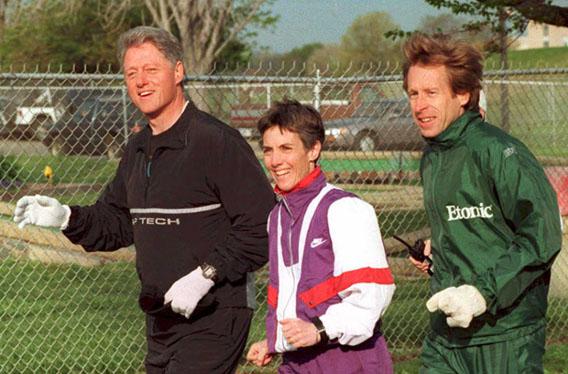In the summer of 1971, Bill Rodgers and his friend Jason Kehoe ambled over to the finish line of the Boston Marathon and ran an imaginary race to the tape. As Rodgers explains in his autobiography Marathon Man, he’d stopped running competitively after his senior year in college. But on that day, wearing street clothes and with a couple of drinks in him, he ran down Ring Road, crossed the line, and flung himself to the ground in faux victory. Soon after, he stopped smoking and started training again. In 1973, he ran the race for real—his first ever marathon—but had to drop out before the finish due to fatigue. A year later, he finally crossed the finish line in Boston, coming in a remarkable 14th. And in 1975, wearing a shirt he found in a dumpster and drinking water out of a shampoo bottle, “Boston Billy” won the race for the first time, setting an American record of 2:09:55.
Rodgers, who grew up in New England and now lives in Boxborough, Mass., would win Boston three more times. For the first time in many years, the man who came to personify the world’s greatest race was not at the finish line on Monday. After greeting runners for several days at the Boston Marathon Expo, the 65-year-old Rodgers was worn out and decided he’d stay at home and watch on TV. His daughter was in the bleachers, though, and his brother Charlie was right down the street from the closing stretch. When he heard about the explosions, Rodgers first made sure that his friends and family were safe. (They were.) Then he thought about the race that inspired him to change his life and all the people who come to Boston every year to run it. “The guys picked the wrong place to do this and the wrong sport,” he says.
Rodgers has always viewed distance running as a competition without antagonisms. “You might try to beat someone,” he says, “but in the end, if you go to the finish line of the marathon, it’s a great celebration.” Monday’s attack transformed that nexus of celebration into a crime scene. But Rodgers believes that nobody can change what this race stands for. In Marathon Man, he writes about how powerful it felt to run through the Boston crowd. “As the miles wore on, their support for me was a tangible thing that hung in the air. Their cheers continually charged me up like a battery, inspiring me to push even harder, to succeed even more.” But this wasn’t just because Rodgers was a champion and a hometown kid. “I think this is true for everyone who runs Boston,” he writes. “The crowd’s support lifts them up.”
Rodgers has run the Boston Marathon a total of 17 times. In 1980, he raced days after getting a phone call threatening his life. Rodgers, who was upset with President Carter’s decision to boycott the 1980 Olympics, had declared that he would run the marathon wearing a black armband. He left the black band at home but ran the race, unbowed, and came in first. Four years ago, Rodgers ran Boston for the first time in a decade, a year after prostate cancer surgery. He finished in 4:06:49, around two hours off his personal best. “I’d run for something larger than myself,” he writes in his autobiography. “That’s what mattered. In a way, it was the most fantastic marathon I’d ever run.”
Though he’s now retired as a marathon runner, Rodgers will travel to the Oklahoma City Memorial Marathon in just a few days to lend his support. That race was created after the bombing of the Murrah Federal Building in 1995, an attack that killed 168 people. The memorial marathon, Rodgers says, is “very powerful,” a testament to the goodwill and community spirit of runners. And in 2014, Boston Billy vows that he’ll be back at the marathon that gave him his name, as the race’s biggest supporter if no longer a competitive runner. “All my friends are going to run next year,” he says. “Are you kidding me? They would never ever let those puny people treat us that way and get away with it. They won’t get away with it.”
